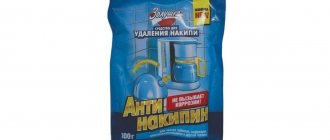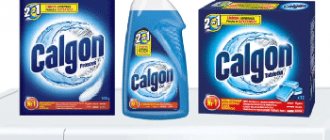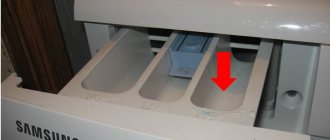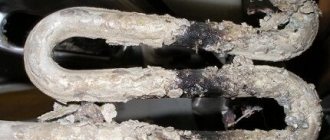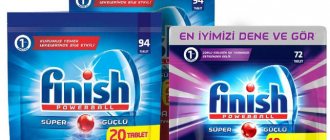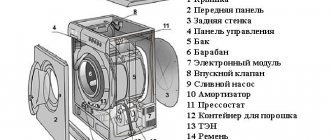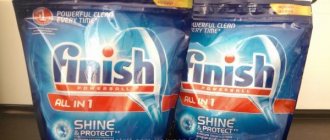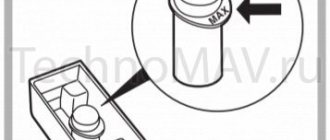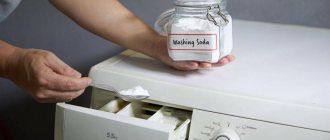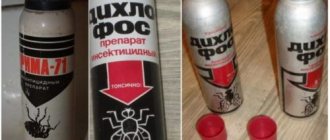Every housewife knows firsthand that ordinary tap water, which we use for domestic needs, contains various salts. The quality of tap water in our homes leaves much to be desired, and it is the salts dissolved in it that cause scale to form inside kettles, washing machines and many other household appliances.
As a result of boiling, salts such as magnesium and calcium bicarbonate settle on the walls of appliances and dishes, and form a dense scale that is so difficult to get rid of.
Every housewife tries to deal with scale, which can cause damage to household appliances. Today, the chemical industry produces various products that can remove salt scale from the walls of dishes or household appliances, and a whole group of such products is anti-scale.
Where does scale come from?
Scale is hard build-up and sediment that appears due to the deposition of chemical elements (magnesium and calcium salts) when exposed to high temperatures (1000). In other words, when water (H2O) boils, the salts are split into two elements - sediment, the one we see at the bottom of the kettle, and carbon dioxide, which evaporates as steam.
In every kettle, sooner or later scale forms - salts of compounds inherent in hard water.
The reason for all this is water hardness. The higher the hardness level, the more minerals in the water. There are 4 degrees: 1 – water quality is normal, 2 – more or less, 3 – poor example of water, 4 – very hard water. Knowing the level of hardness in your home, you can understand exactly how often you need to carry out preventive work.
Scale has a detrimental effect on everything:
- Excess scale on all water heating devices leads to their breakdown.
- The taste of water changes beyond recognition and has a specific smell.
- Increases energy consumption. The device needs to work longer, since it cannot heat the water faster due to plaque build-up.
Scale and rust inside ordinary teapots - metal or enameled - also does not bring joy.
To combat scale, it is important to know what anti-scale products can be used, how to make cleaning more effective and which drugs will 100% cope with the task in a given case.
Mechanical cleaning of heating elements
Understanding the structure of an automatic machine and possessing primitive technical skills for servicing equipment, you can clean the heating element manually. However, it is better to entrust the assembly of the washing machine to a specialist - due to mistakes made, the device may pass current.
The mechanical method is effective - you can clearly see the condition of the heating element before and after treatment.
Disassembling the equipment is not recommended if the warranty period has not expired. After an independent “invasion” the unit is not subject to free service.
General procedure:
- Remove the rear wall of the unit.
- Carefully remove the heating element.
- Using anti-scale agent, clean the heating element; an alternative method is to soak the part in lemon juice or vinegar.
- Remove scale, clean, dry and install heating element. Reassemble the machine in reverse order.
During disassembly, you should also inspect the condition of the moving parts of the drum. Eating them is a more difficult task, which is not recommended to be done on your own.
The heating element must be cleaned very carefully. In this case, the use of sharp tools such as a knife, file or hard metal brush is unacceptable.
If the actions taken did not give the expected effect, then most likely the heating element requires replacement. You can learn more about choosing and installing a heating element from this article.
Why does it work
Scale is mainly composed of calcium and magnesium carbonate. When interacting with citric, acetic, orthophosphoric or other acid, sparingly soluble carbonates of alkaline earth metals are converted into readily soluble salts. For example, acetates. Therefore, acidic substances are effective in the fight against scale, and to enhance the reaction they need to be heated.
Soda, when interacting with water, produces carbonic acid molecules, which, in turn, react with insoluble calcium and magnesium carbonates, turning them into soluble bicarbonates. And they are easily washed off with water and removed with a sponge.
How to clean the outside of a kettle from carbon deposits and grease
Often aluminum and enamel kettles become coated with soot and grease on the outside. If the first aid of washing up liquid and a sponge does not work, try the following 3 methods (for regular enamel, aluminum and stainless steel kettles).
Method 1.
Step 1. Heat the kettle until it is warm enough, but not scalding.
Step 2. Prepare a liquid paste from baking soda and water in proportions of 3:1.
Step 3. Using a sponge, treat all contaminated surfaces with the resulting solution, leave for 5 minutes (optional), and then clean off carbon deposits and grease, making circular movements with the hard side of the sponge.
Step 4: Finally, wipe the kettle clean.
Method 2.
You can clean the outside of the kettle from old carbon deposits and grease by boiling it in a soda solution.
Step 1. Fill a large saucepan/basin/metal bucket with water.
Step 2. Dissolve soda in water at the rate of 1 tablespoon per 1 liter of water.
Step 3: Place your stainless steel cookware in the water and turn on the heat.
Step 4. When the water boils, boil the kettle for another 30 minutes, and then remove the container from the heat and leave to cool.
Step 5. Using the hard side of the sponge, clean off any remaining carbon and grease and finally rinse under running water.
Method 3. Only for stainless steel or aluminum kettles
Aluminum and stainless steel kettles can be cleaned from the outside of carbon deposits, rust and grease by boiling them in a vinegar solution. Just follow the previous instructions, but instead of soda, use 9% table vinegar at the rate of 3 tbsp. spoons per 1 liter of water.
Why descale
The appearance of scale cannot be ignored. It needs to be removed. And the sooner the housewife decides to clean the kettle, the easier and better it will be for the health of the household.
Scale promotes the appearance and proliferation of bacteria. It reduces the service life of the device, in particular electric ones, and leads to its rapid failure. In addition, the chemical compounds contained in scale penetrate into the body with water. Excessive amounts of them can lead to a number of unpleasant consequences. First, the negative impact is reflected on the teeth, and then on the functioning of some organs and systems (osteochondrosis, gout, and urolithiasis develop).
With a one-time consumption of water from a kettle with scale, no pathological symptoms will arise. But you need to understand that salts tend to accumulate. And with regular consumption of such water, the body’s condition will begin to deteriorate.
What is scale and why is it scary?
Before we fight scale, let’s figure out what it is and how it forms.
As you know, tap water contains a certain amount of salts dissolved in it. Most often these are carbonate salts of calcium and magnesium. The hardness of the water depends on their quantity. Accordingly, the more of these salts dissolved in water, the harder it is. The rate of scale formation in water heating devices depends on the hardness of the water. When water is heated, salts are broken down into carbon dioxide and solid sediment, which settles on the surface of the electric heater (or on the walls of a regular kettle). This sediment is scale.
At first glance, the harm caused by scale is only aesthetic. But this is far from true. A layer of solid sediment reduces the ability of the metal from which the heater is made to conduct heat. Consequently, due to the resulting thermal insulation, the heating element is forced to increase its temperature in order to heat the water. Based on the laws of physics, the resistance of a conductor increases as the temperature increases, and the power decreases. Reducing power leads to increased time for heating water. In simple words, a kettle with scale will heat water longer than without it. In addition, a layer of scale can cause significant overheating of the heating device, which leads to its burnout and failure (typical of washing machines and dishwashers).
How to get rid of scale
Knowing who we are dealing with, we can safely begin cleaning the devices and use various methods for this. There are many options for removing this disease, both special and traditional. But first you need to note what not to do:
- Remove sediment mechanically. You will not achieve a positive result, but you will spend a lot of effort and time, and you will also damage the device or deform it. The mechanical method involves using sharp improvised means for cleaning (knife, metal sponge, various types of scrapers).
- Do not use aggressive chemicals. Various kinds of purchased drugs are similar in composition to “Belizna”. You will see the result, but you will not be able to remove the unpleasant pungent odor or completely wash off the product.
- Do not use abrasive objects to scrub off plaque. The scratched surface will be even more exposed to scale.
Before using any method, read the instructions in detail so as not to harm the equipment.
Important! It doesn’t matter what cleaning method you choose, if the equipment is very expensive or requires special care, you should consult a specialist or consult a service center about this.
Harmful factors from using anti-scale agent
When using non-dosed packaging, you can easily make a mistake with the amount of product. Therefore, many housewives advise purchasing individual bags.
Care must be taken when using. Like any chemical, antiscale can damage the skin and mucous membranes of the eyes.
If used after a long break, the descaling agent may act too harshly and pieces of scale will fall off the heating element. This situation will lead to the accumulation of limescale in the internal parts of the appliance and subsequently contaminate the water and laundry.
Which product to choose for cleaning the kettle?
Despite the wide variety of kettle descaling products, the principle of operation of these products is similar to each other. Such cleaners contain substances that, when reacting with calcium salts, help dissolve deposits.
Glass
It tolerates acidic environments well; you can even use soft abrasives to process it. Just do not allow temperature changes under any circumstances: it is unacceptable to wash a hot kettle with cold water - it will burst!
Kettle made of food grade steel
Although stainless, it will, one way or another, react with acid. The inside surface may become rough, causing scale to form faster and more difficult to remove next time. Therefore, the concentration of the acidic solution should be less than in other cases.
Plastic
Do not rub with metal or abrasive pads. Even a regular brush can leave microscopic scratches. Chemical exposure to plastic is not dangerous.
Antiscale: composition and features
“Cinderella” - a multifunctional anti-scale agent Anti-scale is a chemical product designed to rid appliances of scale and lime.
This is the common name for many cleaning products. They are available in the form of powders, pastes, liquid solutions, and tablets. The main active component is acids. Many people use lemon, oxalic, sulfamic. Their volume in the total composition is approximately 30%. Excipients: thiourea and ammonium chloride. The list of last components includes dyes, flavors, sulfates, and chlorides.
The principle of operation of the anti-scale agent is the effect of acids on solid deposits in order to soften them. The plaque comes off the surfaces along with the water and is removed through the drain. The funds have a number of advantages, namely:
- Effective result. The effect is noticeable after the first use.
- Economical consumption. Any mixture is enough for several uses.
- Safe composition for structures and parts. If the proportions are observed, the substances will not harm rubber or plastic.
The disadvantages of the cleaner are the possible clogging of the drain channel with pieces of scale. Other disadvantages are associated with improper use of the mixture.
Antiscale consists of a number of agents that work differently. For example, “Cinderella” is used to remove lime in washing machines, kettles, and dishwashers
If you follow the dosage and rules of use, the drug will be effective and will not damage the rubber inserts in the equipment. To keep heating elements in good condition, it is recommended to perform Cinderella cleaning twice a year.
The drug "Greenfield Rus" produces a composition for cleaning dishwashers and washing units. Sold in large packages. About 60 g of product is used at one time.
The Furman product produces anti-scale for teapots and washing machines. Users say that it protects equipment from lime build-up. The drug is sold in an individual package designed for one-time use. To prevent the appearance of deposits, prophylaxis is carried out once every six months.
Important! All of the above means are used when the equipment is idling. Also, do not exceed the dosage or clean the device too often. This may damage internal parts.
Causes and first signs of scale appearance
The formation of sediment is a real scourge not only of washing machines, but also of all household devices whose operation is based on heating running water. Hard deposits appear on parts responsible for heating and evaporating the liquid. As a rule, a heating element - a tubular electric heater - copes with this task.
The likelihood and speed of clogging of the heating element depends on the quality of the incoming water, the washing temperature and the frequency of use of the unit. If the machine regularly operates at 60° and above, then salt deposits accumulate more intensely.
The first signs of excessive scale formation:
- increased noise of the washing machine during the water heating stage;
- clothes become harder to wash, light-colored linen takes on a grayish tint;
- the machine does not heat up well - the door glass remains cold throughout the entire washing cycle;
- the appearance of an unpleasant odor on washed items and inside the drum;
- to achieve a good result you have to increase the amount of powder.
To finally verify the assumptions, it is advisable to inspect the heating element itself. The heating element is located under the washing machine tank or is slightly offset from the center to one side.
The appearance of a crust is promoted by magnesium and calcium salts - when the temperature rises, the elements are converted into solid sediment and carbon dioxide. Mixing with impurities and particles of rust, the deposits harden, covering the metal heating element and other parts of the washer with a film
If the presence of deposits has been diagnosed, then it’s time to begin descaling measures. Timely cleaning will help restore the heating element to normal efficiency and avoid a more serious problem - expensive equipment repairs.
Armed with a flashlight, you should shine it on the drum holes. In this case, the tank must be turned or rocked a little in order to better examine the heating element.
Antiscale safety level
Some users are afraid to use lime dissolving cleaners because they have a “nuclear” composition. Of course, any chemicals are harmful, since the acids they contain can corrode even metal elements.
To ensure safety when using the cleaner, it must be used strictly according to the instructions, maximum once a quarter. If you follow the basic rules and dosage standards, no negative effect will occur.
Some housewives have adapted to using sodium carbonate (soda ash). This is a good option, but it doesn’t always help.
Mode of application
First, you should carefully read the instructions for using the product. Manufacturers usually indicate such information on the packaging. Each drug may have different dosages. This depends on the brand of the product and the form of its release.
It is possible to find liquid, powder and tablet substances on sale. Advantage in choice should be given to liquid products. They are able to dissolve faster in water, and, therefore, begin to perform their functions of descaling faster than powder preparations.
Important! Do not violate the dosage and frequency of use recommended by the manufacturer. You can cause irreparable damage to an automatic machine.
The general rule for using anti-scale is to use it without loading the machine with laundry, that is, at idle speed. The product is placed inside the drum, any program with a temperature of 40°C degrees is turned on without pre-washing. After finishing the wash, the internal components of the washing unit will be cleaned of scale.
Before working with the chemical preparation “Antinakipin”, it is necessary to protect the skin of your hands with rubber gloves. If used carelessly, you can get a chemical burn. If the product does get on the skin or mucous parts, you need to rinse them with copious amounts of water.
Folk remedies for cleaning
It is no secret that in the good old days there was not such an abundance of special means for cleaning and removing plaque, and certainly not a lot of money to constantly update everything that was damaged by scale. All available methods were used, those that are available at home, and those that are not very expensive. We experimented and found a couple of proven methods for keeping devices clean, as they say, the methods came from the people.
Old scale in a kettle can be cleaned using a combination of many methods.
How to clean scale with brine
- Suitable for any teapots.
- Proportions: the kettle must be filled ¾ full.
- Pros: simplicity, accessibility.
- Cons: does not cope with persistent plaque, specific smell.
The brine contains lactic and acetic acids. Fill the kettle with strained cucumber or tomato brine and boil for 20–30 minutes.
After this, drain the brine and scale and wash the kettle with a soft sponge and cleaning agent.
How to clean scale with soda, citric acid and vinegar
- Suitable for any teapots.
- Proportions: 1 tablespoon of soda, 1 tablespoon of citric acid and a glass of vinegar per liter of water.
- Plus: it even breaks up rock salt deposits.
- Disadvantages: troublesome, strong smell, exposure to aggressive components on devices.
Fill the kettle with water, add soda and citric acid and boil. If the kettle is electric, do this 2-3 times. If regular, let the lemon soda solution bubble for 20-30 minutes.
Drain and refill the kettle with water. Boil it and pour in vinegar. Leave for 15–20 minutes.
If after this the scale does not come off on its own, it will become loose. You can easily remove it with a sponge and dishwashing detergent.
At the end, boil clean water in the kettle again and then drain it.
Anti-scale for dummies
A kettle, steamer, pots and coffee maker can be descaled using Silit Anti-Scaling.
This liquid product is added to the container in the amount specified in the instructions. After this, the surface is cleaned. Next, water is poured into the container and should boil a little. Anti-scale can be removed from a kettle or coffee maker with a rag or sponge. You can remove scale from the kettle using available means:
- The citric acid solution will dissolve the impurities deposited on the filters. It is prepared from a liter of water and a bag of acid. The solution should be boiled.
- “Sprite” or “Coca-Cola” - just boil these drinks in a coffee maker, saucepan or kettle to remove scale from them.
- Apple or potato peels are boiled in a container that needs to be cleaned. After this, scale is removed from the surfaces with a rag or sponge.
The descaling agent can be purchased at regular hardware stores, supermarkets or ordered online. By using Antiscale strictly according to the instructions, you can extend the life of the equipment. But since it is a chemical drug, it is not recommended to use it often.
Anti-scale agent for dishwashers
Most often available in tablet format. Contributes to high-quality cleaning of unit parts.
WPRO Antiscale
The grease and scale remover belongs to the universal group and can also be used in automatic washing machines. The use of the drug provides a triple effect: it extends the life of large household appliances, removes scale, grease and detergent residues, and eliminates unpleasant odors.
Available in single dose sachets. In accordance with the instructions for use, pour the contents of the package into the detergent compartment and start the idle washing or washing mode.
Inside the bag there is a wet substance with a strong odor, so you must act carefully and protect your eyes from irritation. But the effect of the product is remarkable: the filter becomes like new, and the car itself sparkles with freshness. The manufacturer recommends using the product once a month.
Advantages:
- Copes well with the task;
- Ease of use;
- Affordable price.
Flaws:
- A pungent odor that disappears after use.
Consumers note that Antiscale does an excellent job, but during initial use, if the equipment has not been cleaned for a long time, an unpleasant odor may appear. It will disappear after three to four uses of the cleaner.
Finish
A special product from a Polish manufacturer in the form of salt is designed to protect the dishwasher from lime deposits. It improves the performance of equipment, softens hard water, protects parts from scale, eliminates smudges, and prevents the formation of limescale, dirt and grease.
Available in 3kg packs. The beautiful and bright design of the bags immediately catches your eye. Visually, the salt appears as large 5 mm granules. This size allows you to reduce product consumption without compromising the quality of its work. Thanks to economical use, the cleaner lasts for a long time.
The manufacturer indicated only one function of the product - water softening. But by completing this task, scale stops forming and deposits do not settle on the walls of the machine. The drug is kept in places inaccessible to children. Shelf life is two years.
Advantages:
- Economical consumption;
- Effectively softens water;
- Durable packaging;
- Can be used for prevention;
- Often sold on promotions.
Flaws:
- The packaging is not very convenient (according to reviews).
Buyers give the product a high rating and recommend it to other users for purchase.
Preventing scale from appearing in a kettle
The number of procedures to get rid of salt deposits can be significantly reduced if you follow simple recommendations:
- You cannot boil the same water more than once.
- Do not leave water in the kettle. After cooling, it can be poured into a decanter.
- It is good if after use the device is rinsed with running water and wiped with a soft cloth.
- It is not recommended to use ordinary tap water for boiling. Filtering or using bottled water will help reduce the calcification process.
- It is necessary to carry out timely cleaning of lime deposits, avoiding the accumulation of a large layer of scale.
It is much easier to deal with a small amount of sediment, so do not delay this procedure
Anti-scale agents for coffee machines
Products of different formats are suitable for decalcification, but experts recommend using liquid formulations. They are more practical and easy to dispense. Regardless of the form, it is advisable to give preference to universal products that simultaneously dissolve accumulated deposits and remove greasy deposits.
Philips CA6700/10
Only the manufacturer of the equipment knows best how to care for it and what products to use. Therefore, Philips has developed an optimal liquid for decalcifying coffee machines and recommends CA6700/10 for use.
The product perfectly descales, dissolves and destroys coffee oil and other fats. It takes care of the parts made of different materials that are inside the coffee machine mechanism.
The product is produced in doses for one cleaning. It is enough to dilute it with the specified amount of water and pour it into the machine’s container.
Pros:
- cleanses effectively;
- good quality;
- exact dosage, no need to measure;
- cleaning lasts for several months.
Minuses:
- high consumption;
- expensive.
HG for descaling coffee machines
The uniqueness of the HG company from the Netherlands is its specialization in the production of detergents and cleaning products for the home and household equipment.
Thanks to its unique formula, HG effectively decalcifies all coffee preparation devices, including espresso and capsule machines. The environmentally friendly liquid is odorless and does not affect the taste. Consists of carboxylic citric acids.
Pros:
- performs its function perfectly;
- removes scale without a trace;
- enough for 5-6 uses;
- price;
- soft and quick cleaning;
- good quality.
Minuses:
- a thick layer of scale may not be removed in one go.
Bosch Tassimo TCZ6004
A product for dissolving scale in coffee machines from a German brand is made in tablet format. The package contains four “pills” weighing 18 grams each. This amount is enough to carry out decalcification twice, i.e. two tablets per cleanse.
The composition of the product is represented by three types of acids - sulfamide, citric and maleic. Thanks to this, existing lime deposits are effectively dissolved. But it can’t cope with coffee fat deposits.
The product is intended for use in capsule-type coffee machines with an automatic cleaning program.
Advantages:
- The tablets are completely soluble in water;
- Effective – the taste and aroma of coffee is significantly improved;
- Allowed to be used for preventive purposes;
- Hermetically sealed.
Flaws:
- High price;
- Does not remove greasy coffee deposits.
De'Longhi Eco Decalk DLSC500
The drug is offered in a popular liquid form. It belongs to the group of universal ones and can be used with any type of Delonghi coffee machines.
De'Longhi Eco Decalk DLSC500 is an environmentally friendly product, since the manufacturer chose harmless lactic acid as the active chemical component. It ensures effective dissolution of deposits, but does not harm the working mechanisms of the coffee machine. De'Longhi is three times more effective than conventional products and maintains the working condition of the coffee machine well.
Available in 500 ml durable plastic bottles. This is enough for five procedures. For ease of dosing, the manufacturer has placed special markings on the walls of the package. The action time of the solvent is 30 minutes. To prevent damage to the heating elements of the equipment, decalcification must be carried out once every month and a half.
Advantages:
- Convenient packaging;
- There is a measuring scale for easy dosing;
- Effective plaque removal;
- Environmentally friendly composition based on lactic acid;
- Does not cause an allergic reaction.
Flaws:
- Not detected.
The coffee machine descaling product is getting good reviews. Users note the convenient format and labeling, which simplifies dosage. I especially like that after finishing the cleaning program, additional flushing of the system is not required.
Ways to combat scale
As it became clear from the above, solid deposits on the bottom of kettles and heating elements need to be dealt with. There are several ways:
- reduction of water hardness;
- technological;
- chemical.
Reducing the hardness, or softening, of water is carried out using special filters or magnetic converters that are installed on the water supply line.
A technological method for preventing and preventing the appearance of scale is being developed by manufacturers of household appliances (for example, self-cleaning systems in irons). But built-in systems do not always cope with hard water, which requires the use of a third method - chemical.
The chemical method involves treating the surfaces of heating elements with acid-containing agents. This method of combating lime deposits is the most common at home. It is effective, but has its own characteristics depending on the form and composition of the products used.
Separately, it is worth highlighting folk methods of combating scale. Many people are suspicious of store-bought “chemical” detergents and cleaners and prefer to use natural “natural” cleaners. Two products are most often used to combat scale:
- lemon acid;
- table vinegar.
Let's not hide this, they really remove scale and quite effectively, because they are acids. But there is one small but significant nuance. Both citric and acetic acids without softening additives have an aggressive effect on plastic, rubber and metal parts, including parts of electrical appliances, which, if used frequently, can lead to equipment breakdown. In addition, we cannot independently calculate the required concentration of these agents for various situations. And dosing at random will only lead to high costs for repairing electrical appliances.
Limescale removers for washing machines and dishwashers
A Russian-made liquid product that contains citric acid, lactic acid, polycarboxylates and other functional additives. According to the manufacturer, it not only effectively removes scale from washing machines and dishwashers, but is an environmentally friendly product.
Volume: 200 ml. Cost: from 122 rub.
Clean Home from scaleAdvantages:
- not only cleans, but eliminates unpleasant odors;
- does not contain synthetic dyes or fragrances;
- does not leave behind any pungent odors or residue and is easily washed off with water.
Flaws:
- Only enough for one use.
Filtero
Product in powder form based on citric acid. Used to remove plaque from washing machines and dishwashers.
Weight: 200 gr. Cost: from 180 rub.
Filtero descalerAdvantages:
- removes scale the first time.
Flaws:
- the composition does not indicate which excipients soften the effect of citric acid;
- The packaging is enough for one time in the washing machine or two times in the dishwasher.
Topper
Express cleaner based on anhydrous citric acid. Acid sulfite softens the effects of citric acid and protects rubber and plastic parts of cars. Made in Italy.
Weight: 125 gr. Cost: from 180 rub.
Anti-scale topperAdvantages:
- effectively removes old scale.
Flaws:
- does not remove scale the first time and requires repeated use;
- packaging for one use.
Electrolux Descaler
Powdered product based on citric acid. Additional components included in the powder protect rubber and plastic parts of devices from the aggressive effects of acid. Made in Italy.
Volume: 200 ml. Cost: 470 rub.
Electrolux DescalerAdvantages:
- removes scale from the first use;
- has no smell.
Flaws:
- not found.
How to use anti-scale and clean your washing machine
When thinking about how to use chemicals to descale SM, look at the label of the chosen product. Usually the dosages are written on the bottle or packaging. Each product has its own dosage, this is important. If you buy portioned cleaners, there will be no problems: use 1 dose for 1 cleaning. And for large packages, reading the instructions is mandatory.
There are general rules for using all descaling products:
- The washing machine can only be cleaned when the drum is empty.
- Use the products carefully. Make sure that the chemical does not get on your skin or eyes. Use personal protective equipment: goggles, a respirator, or at least gloves.
- Do not exceed the permissible dosage.
Now you know how to clean your washing machine with anti-scale. But what if you don’t trust store-bought products, but the problem of hard water needs to be solved somehow? Find ideas and tips below.
Un Momento
How to use anti-scale agent for washing machines
Anti-scale agent Un Momento is a concentrated liquid that, according to manufacturers, quickly removes limescale and does not harm plastic and steel parts of the SMA. Among the features we note the following:
- Recommended for use by leading brands of washing machines.
- Non-toxic, harmless.
- Without fillers and ballast components.
- Available in disposable packaging.
It is used like this: pour 3 doses of the product into an empty drum, start the washing mode at 60 degrees, wait until the end of the program.
The composition contains organic food acids, special food mixtures of alkali metal salts and prepared water.
Scrubman
The manufacturer positions Scrubman as anti-scale agent No. 1. Suitable for removing scale from all washing machines. Available in packages of 250 g. Contains organic acid and complexing agent.
Chistoff
Belarusian descaling agent with a “thermonuclear” composition: purified water, hydrochloric acid, sodium laureth sulfate, dye. After studying customer reviews, we came to the conclusion that even with such an aggressive composition, the product cannot cope with cleaning large layers of scale. Therefore, it is hardly worth taking risks and buying such aggressive chemicals with such minimal effect.
"Cinderella"
Cinderella is available in both powder and liquid form. The latter is more common than powder. A standard bottle holds 0.25 liters. One bottle is used for one cleaning procedure.
To descale SMA, you need to pour the contents of the bottle into the drum without laundry and run a wash cycle with a temperature between 40-50 degrees.
How to make antinaikpin with your own hands
It will probably not be a secret to you that the most common means that can be found in everyday life or in any store can fight scale. So, here is a rating of products that can be used instead of store-bought chemicals:
- lemon acid;
- Coca-Cola;
- vinegar essence (diluted).
Do you want to clean your machine cheaply and effectively? Using a “lemon”, pour it directly into the drum (a pack of up to 100 g is enough), and run the wash idle at 40 degrees.
If you want to use Coca-Cola, you will need about 3 liters of the sweet drink. Do you feel bad about pouring a drink into the machine? Ask the store if they have an expired batch - this is also suitable for SMA.
Using vinegar essence, measure out 50 g of liquid, diluting it with half a glass of water. Pour the liquid into the drum, start the 40-degree mode.
Make an anti-scale agent yourself or buy a ready-made product in the store and use it about 2 times a year to protect the machine from breakdowns.
Description of popular brands
| Brand name | Product type | Single dose | Mode temperature °C | Price | Reviews |
| "Cinderella" | Liquid, 250 ml | 250 ml | 40–50 | 33,10 ₽ | “I was pleased with the price and versatility. He copes with the task." Nikolay, Vologda |
| Scrubman | Bulk, 250 g | 250 mg | Not lower than 60 | 71 ₽ | “After “Scrubman” the heating element was as good as new, even the machine stopped making noise.” Oksana, Samara |
| Un momento | Liquid masterbatch 5x10 | 3 microdoses | 60 | 127 ₽ | “Un Momento” for the washing machine is excellent, very effective. Convenient format - no spills or spills." Olga, Moscow |
| "Chistoff" | Liquid, 1000 ml | Dilute with water from 1:2 to 1:10 | Not higher than 40 | 52 ₽ | “Inexpensive, large volume, but the smell is not very pleasant.” Anastasia, Voronezh |
Prevention of carbonate and sulfate precipitation
The appearance of deposits is slowed down by following the manufacturers' recommendations for the operation of SMA: wash in a heating mode of <60ºC, use powders that include anti-scale additives. Excessive loads and incorrectly chosen mode also accelerate the formation of deposits.
Other areas of prevention:
- reduce water hardness using softening filters and demagnetizers;
- refuse to wash heavily worn clothes: fabric particles settle on the heating element;
- do not use powders from an unknown manufacturer;
- Regularly clean the pump filter from accumulated debris.
It is not recommended to use Calgon for prophylaxis for a long time: the substances it contains gradually accumulate on the surface of the heating element and are cemented into a crust of even greater hardness. The result will be known - destruction of the heater.
Preventive measures
In order to always be able to drink only tasty drinks from your own kettle and to extend its service life, it is necessary to take preventive measures to prevent the formation of hardness salts:
- Make it a rule to drain the water every time after use.
- Before pouring the next portion of water , try to walk a little with a washcloth along the walls and rinse regularly.
- Place water filters on your taps and there will be fewer impurities. If possible, it is better to use distilled water for drinks; it does not contain mineral deposits.
- Try to purchase only devices with a heating disk or closed spiral. They are easier to care for.
- Don't push the kettle to extremes, it's easier to do it more often, but not for long. It’s both good for technology and not burdensome for you.
